Health Promotion Plan: Promoting Healthy Eating Habits in Preschoolers
VerifiedAdded on 2023/01/18
|13
|3448
|26
Report
AI Summary
This report outlines a comprehensive health promotion plan designed to address unhealthy eating habits and childhood obesity among preschoolers. The plan emphasizes the importance of educating parents on healthy eating practices, recognizing that children are observational learners who often mimic their parents' behaviors. It incorporates the Trans-theoretical Model to guide behavior change, moving parents through stages from pre-contemplation to maintenance. The plan stresses the use of audio-visual resources and simple language to improve understanding, particularly for parents with low health literacy. The SMART goals are to educate parents about healthy eating, aiming to change their and their children's behaviors. The report details evidence-based session plans, including interactive methods like pamphlets, PowerPoint presentations, documentaries, and interactive sessions, to help parents identify and address unhealthy eating habits and their consequences. Evaluation strategies, such as parent satisfaction forms and quizzes, are proposed to assess the plan's effectiveness.
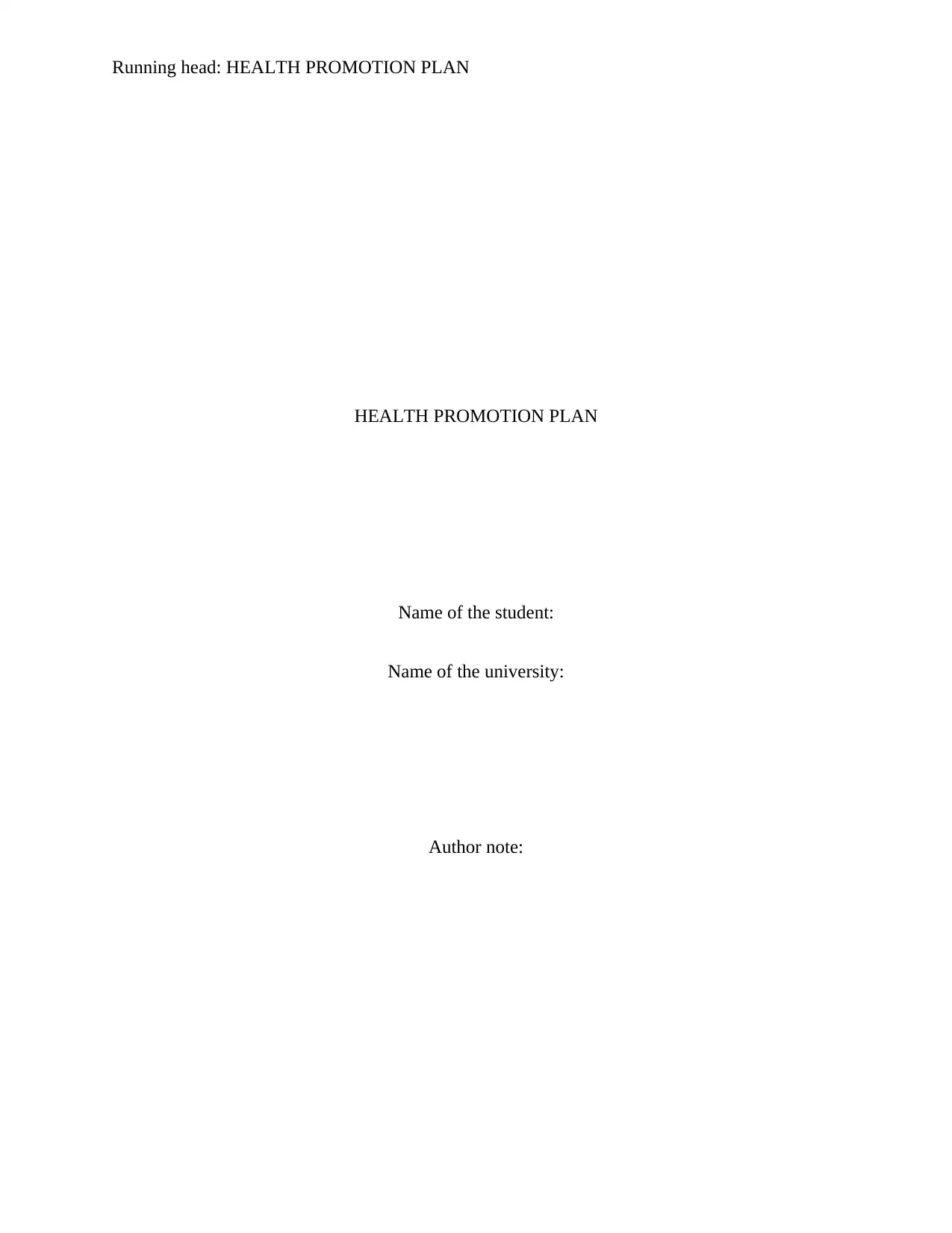
Running head: HEALTH PROMOTION PLAN
HEALTH PROMOTION PLAN
Name of the student:
Name of the university:
Author note:
HEALTH PROMOTION PLAN
Name of the student:
Name of the university:
Author note:
Paraphrase This Document
Need a fresh take? Get an instant paraphrase of this document with our AI Paraphraser
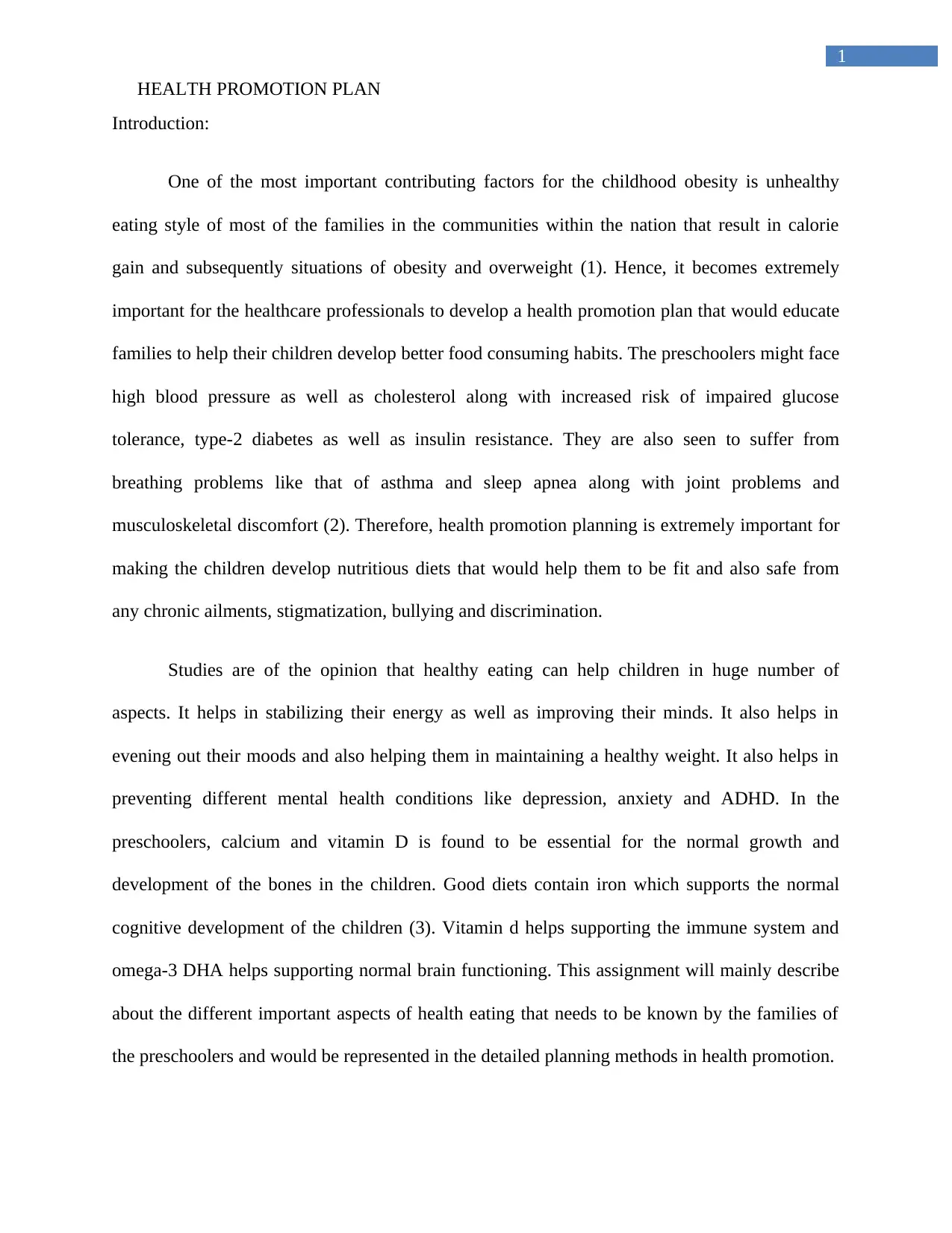
1
HEALTH PROMOTION PLAN
Introduction:
One of the most important contributing factors for the childhood obesity is unhealthy
eating style of most of the families in the communities within the nation that result in calorie
gain and subsequently situations of obesity and overweight (1). Hence, it becomes extremely
important for the healthcare professionals to develop a health promotion plan that would educate
families to help their children develop better food consuming habits. The preschoolers might face
high blood pressure as well as cholesterol along with increased risk of impaired glucose
tolerance, type-2 diabetes as well as insulin resistance. They are also seen to suffer from
breathing problems like that of asthma and sleep apnea along with joint problems and
musculoskeletal discomfort (2). Therefore, health promotion planning is extremely important for
making the children develop nutritious diets that would help them to be fit and also safe from
any chronic ailments, stigmatization, bullying and discrimination.
Studies are of the opinion that healthy eating can help children in huge number of
aspects. It helps in stabilizing their energy as well as improving their minds. It also helps in
evening out their moods and also helping them in maintaining a healthy weight. It also helps in
preventing different mental health conditions like depression, anxiety and ADHD. In the
preschoolers, calcium and vitamin D is found to be essential for the normal growth and
development of the bones in the children. Good diets contain iron which supports the normal
cognitive development of the children (3). Vitamin d helps supporting the immune system and
omega-3 DHA helps supporting normal brain functioning. This assignment will mainly describe
about the different important aspects of health eating that needs to be known by the families of
the preschoolers and would be represented in the detailed planning methods in health promotion.
HEALTH PROMOTION PLAN
Introduction:
One of the most important contributing factors for the childhood obesity is unhealthy
eating style of most of the families in the communities within the nation that result in calorie
gain and subsequently situations of obesity and overweight (1). Hence, it becomes extremely
important for the healthcare professionals to develop a health promotion plan that would educate
families to help their children develop better food consuming habits. The preschoolers might face
high blood pressure as well as cholesterol along with increased risk of impaired glucose
tolerance, type-2 diabetes as well as insulin resistance. They are also seen to suffer from
breathing problems like that of asthma and sleep apnea along with joint problems and
musculoskeletal discomfort (2). Therefore, health promotion planning is extremely important for
making the children develop nutritious diets that would help them to be fit and also safe from
any chronic ailments, stigmatization, bullying and discrimination.
Studies are of the opinion that healthy eating can help children in huge number of
aspects. It helps in stabilizing their energy as well as improving their minds. It also helps in
evening out their moods and also helping them in maintaining a healthy weight. It also helps in
preventing different mental health conditions like depression, anxiety and ADHD. In the
preschoolers, calcium and vitamin D is found to be essential for the normal growth and
development of the bones in the children. Good diets contain iron which supports the normal
cognitive development of the children (3). Vitamin d helps supporting the immune system and
omega-3 DHA helps supporting normal brain functioning. This assignment will mainly describe
about the different important aspects of health eating that needs to be known by the families of
the preschoolers and would be represented in the detailed planning methods in health promotion.
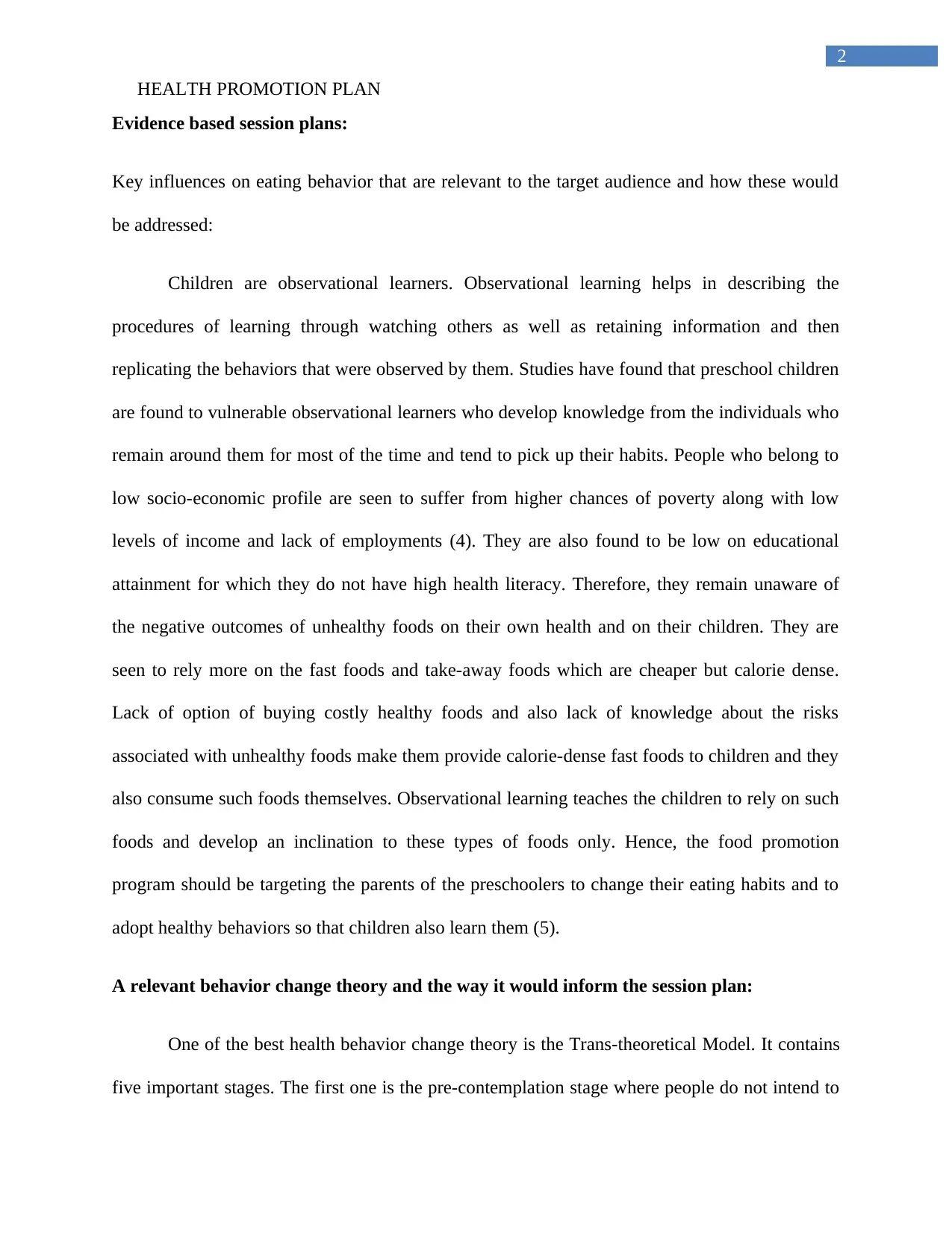
2
HEALTH PROMOTION PLAN
Evidence based session plans:
Key influences on eating behavior that are relevant to the target audience and how these would
be addressed:
Children are observational learners. Observational learning helps in describing the
procedures of learning through watching others as well as retaining information and then
replicating the behaviors that were observed by them. Studies have found that preschool children
are found to vulnerable observational learners who develop knowledge from the individuals who
remain around them for most of the time and tend to pick up their habits. People who belong to
low socio-economic profile are seen to suffer from higher chances of poverty along with low
levels of income and lack of employments (4). They are also found to be low on educational
attainment for which they do not have high health literacy. Therefore, they remain unaware of
the negative outcomes of unhealthy foods on their own health and on their children. They are
seen to rely more on the fast foods and take-away foods which are cheaper but calorie dense.
Lack of option of buying costly healthy foods and also lack of knowledge about the risks
associated with unhealthy foods make them provide calorie-dense fast foods to children and they
also consume such foods themselves. Observational learning teaches the children to rely on such
foods and develop an inclination to these types of foods only. Hence, the food promotion
program should be targeting the parents of the preschoolers to change their eating habits and to
adopt healthy behaviors so that children also learn them (5).
A relevant behavior change theory and the way it would inform the session plan:
One of the best health behavior change theory is the Trans-theoretical Model. It contains
five important stages. The first one is the pre-contemplation stage where people do not intend to
HEALTH PROMOTION PLAN
Evidence based session plans:
Key influences on eating behavior that are relevant to the target audience and how these would
be addressed:
Children are observational learners. Observational learning helps in describing the
procedures of learning through watching others as well as retaining information and then
replicating the behaviors that were observed by them. Studies have found that preschool children
are found to vulnerable observational learners who develop knowledge from the individuals who
remain around them for most of the time and tend to pick up their habits. People who belong to
low socio-economic profile are seen to suffer from higher chances of poverty along with low
levels of income and lack of employments (4). They are also found to be low on educational
attainment for which they do not have high health literacy. Therefore, they remain unaware of
the negative outcomes of unhealthy foods on their own health and on their children. They are
seen to rely more on the fast foods and take-away foods which are cheaper but calorie dense.
Lack of option of buying costly healthy foods and also lack of knowledge about the risks
associated with unhealthy foods make them provide calorie-dense fast foods to children and they
also consume such foods themselves. Observational learning teaches the children to rely on such
foods and develop an inclination to these types of foods only. Hence, the food promotion
program should be targeting the parents of the preschoolers to change their eating habits and to
adopt healthy behaviors so that children also learn them (5).
A relevant behavior change theory and the way it would inform the session plan:
One of the best health behavior change theory is the Trans-theoretical Model. It contains
five important stages. The first one is the pre-contemplation stage where people do not intend to
⊘ This is a preview!⊘
Do you want full access?
Subscribe today to unlock all pages.

Trusted by 1+ million students worldwide
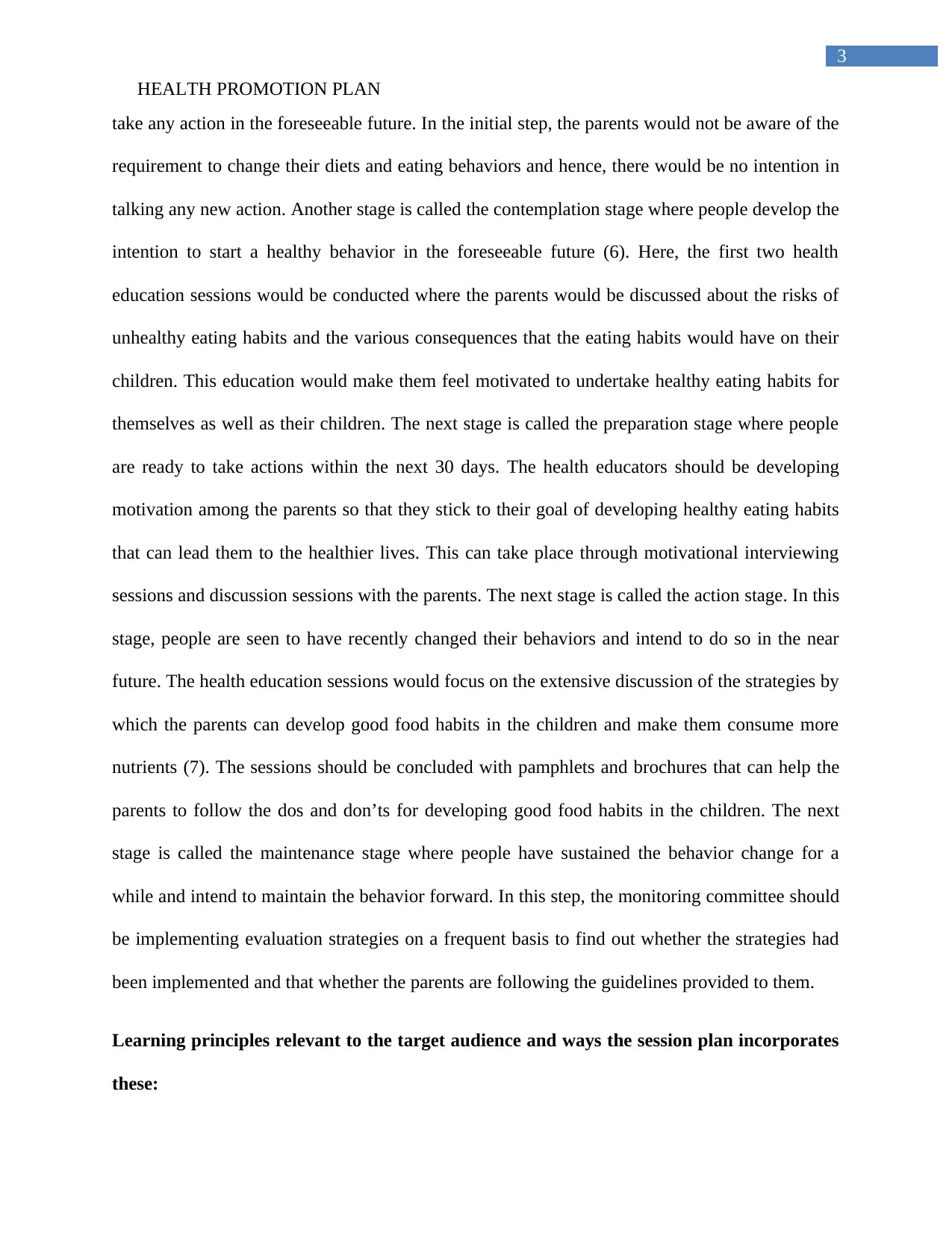
3
HEALTH PROMOTION PLAN
take any action in the foreseeable future. In the initial step, the parents would not be aware of the
requirement to change their diets and eating behaviors and hence, there would be no intention in
talking any new action. Another stage is called the contemplation stage where people develop the
intention to start a healthy behavior in the foreseeable future (6). Here, the first two health
education sessions would be conducted where the parents would be discussed about the risks of
unhealthy eating habits and the various consequences that the eating habits would have on their
children. This education would make them feel motivated to undertake healthy eating habits for
themselves as well as their children. The next stage is called the preparation stage where people
are ready to take actions within the next 30 days. The health educators should be developing
motivation among the parents so that they stick to their goal of developing healthy eating habits
that can lead them to the healthier lives. This can take place through motivational interviewing
sessions and discussion sessions with the parents. The next stage is called the action stage. In this
stage, people are seen to have recently changed their behaviors and intend to do so in the near
future. The health education sessions would focus on the extensive discussion of the strategies by
which the parents can develop good food habits in the children and make them consume more
nutrients (7). The sessions should be concluded with pamphlets and brochures that can help the
parents to follow the dos and don’ts for developing good food habits in the children. The next
stage is called the maintenance stage where people have sustained the behavior change for a
while and intend to maintain the behavior forward. In this step, the monitoring committee should
be implementing evaluation strategies on a frequent basis to find out whether the strategies had
been implemented and that whether the parents are following the guidelines provided to them.
Learning principles relevant to the target audience and ways the session plan incorporates
these:
HEALTH PROMOTION PLAN
take any action in the foreseeable future. In the initial step, the parents would not be aware of the
requirement to change their diets and eating behaviors and hence, there would be no intention in
talking any new action. Another stage is called the contemplation stage where people develop the
intention to start a healthy behavior in the foreseeable future (6). Here, the first two health
education sessions would be conducted where the parents would be discussed about the risks of
unhealthy eating habits and the various consequences that the eating habits would have on their
children. This education would make them feel motivated to undertake healthy eating habits for
themselves as well as their children. The next stage is called the preparation stage where people
are ready to take actions within the next 30 days. The health educators should be developing
motivation among the parents so that they stick to their goal of developing healthy eating habits
that can lead them to the healthier lives. This can take place through motivational interviewing
sessions and discussion sessions with the parents. The next stage is called the action stage. In this
stage, people are seen to have recently changed their behaviors and intend to do so in the near
future. The health education sessions would focus on the extensive discussion of the strategies by
which the parents can develop good food habits in the children and make them consume more
nutrients (7). The sessions should be concluded with pamphlets and brochures that can help the
parents to follow the dos and don’ts for developing good food habits in the children. The next
stage is called the maintenance stage where people have sustained the behavior change for a
while and intend to maintain the behavior forward. In this step, the monitoring committee should
be implementing evaluation strategies on a frequent basis to find out whether the strategies had
been implemented and that whether the parents are following the guidelines provided to them.
Learning principles relevant to the target audience and ways the session plan incorporates
these:
Paraphrase This Document
Need a fresh take? Get an instant paraphrase of this document with our AI Paraphraser
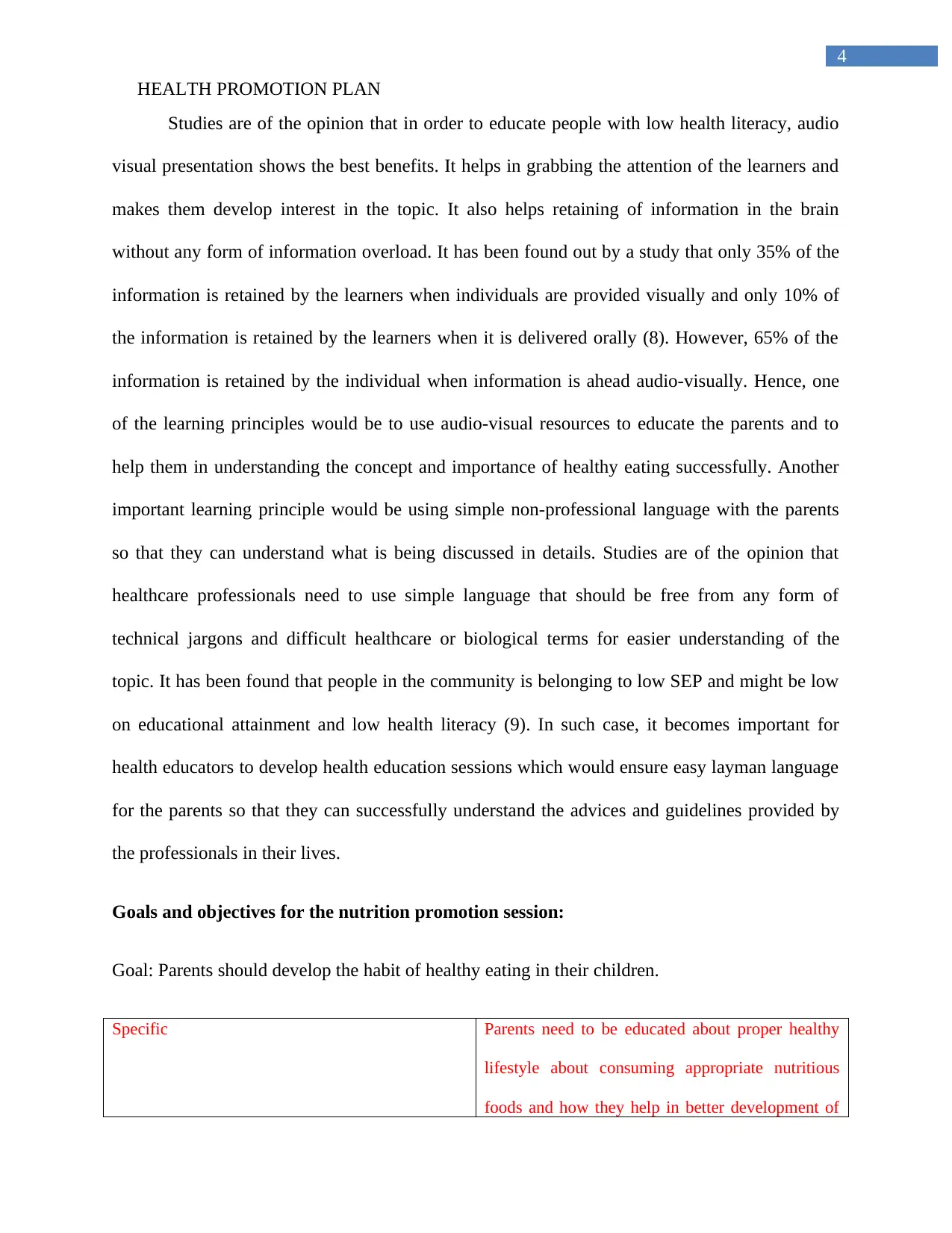
4
HEALTH PROMOTION PLAN
Studies are of the opinion that in order to educate people with low health literacy, audio
visual presentation shows the best benefits. It helps in grabbing the attention of the learners and
makes them develop interest in the topic. It also helps retaining of information in the brain
without any form of information overload. It has been found out by a study that only 35% of the
information is retained by the learners when individuals are provided visually and only 10% of
the information is retained by the learners when it is delivered orally (8). However, 65% of the
information is retained by the individual when information is ahead audio-visually. Hence, one
of the learning principles would be to use audio-visual resources to educate the parents and to
help them in understanding the concept and importance of healthy eating successfully. Another
important learning principle would be using simple non-professional language with the parents
so that they can understand what is being discussed in details. Studies are of the opinion that
healthcare professionals need to use simple language that should be free from any form of
technical jargons and difficult healthcare or biological terms for easier understanding of the
topic. It has been found that people in the community is belonging to low SEP and might be low
on educational attainment and low health literacy (9). In such case, it becomes important for
health educators to develop health education sessions which would ensure easy layman language
for the parents so that they can successfully understand the advices and guidelines provided by
the professionals in their lives.
Goals and objectives for the nutrition promotion session:
Goal: Parents should develop the habit of healthy eating in their children.
Specific Parents need to be educated about proper healthy
lifestyle about consuming appropriate nutritious
foods and how they help in better development of
HEALTH PROMOTION PLAN
Studies are of the opinion that in order to educate people with low health literacy, audio
visual presentation shows the best benefits. It helps in grabbing the attention of the learners and
makes them develop interest in the topic. It also helps retaining of information in the brain
without any form of information overload. It has been found out by a study that only 35% of the
information is retained by the learners when individuals are provided visually and only 10% of
the information is retained by the learners when it is delivered orally (8). However, 65% of the
information is retained by the individual when information is ahead audio-visually. Hence, one
of the learning principles would be to use audio-visual resources to educate the parents and to
help them in understanding the concept and importance of healthy eating successfully. Another
important learning principle would be using simple non-professional language with the parents
so that they can understand what is being discussed in details. Studies are of the opinion that
healthcare professionals need to use simple language that should be free from any form of
technical jargons and difficult healthcare or biological terms for easier understanding of the
topic. It has been found that people in the community is belonging to low SEP and might be low
on educational attainment and low health literacy (9). In such case, it becomes important for
health educators to develop health education sessions which would ensure easy layman language
for the parents so that they can successfully understand the advices and guidelines provided by
the professionals in their lives.
Goals and objectives for the nutrition promotion session:
Goal: Parents should develop the habit of healthy eating in their children.
Specific Parents need to be educated about proper healthy
lifestyle about consuming appropriate nutritious
foods and how they help in better development of
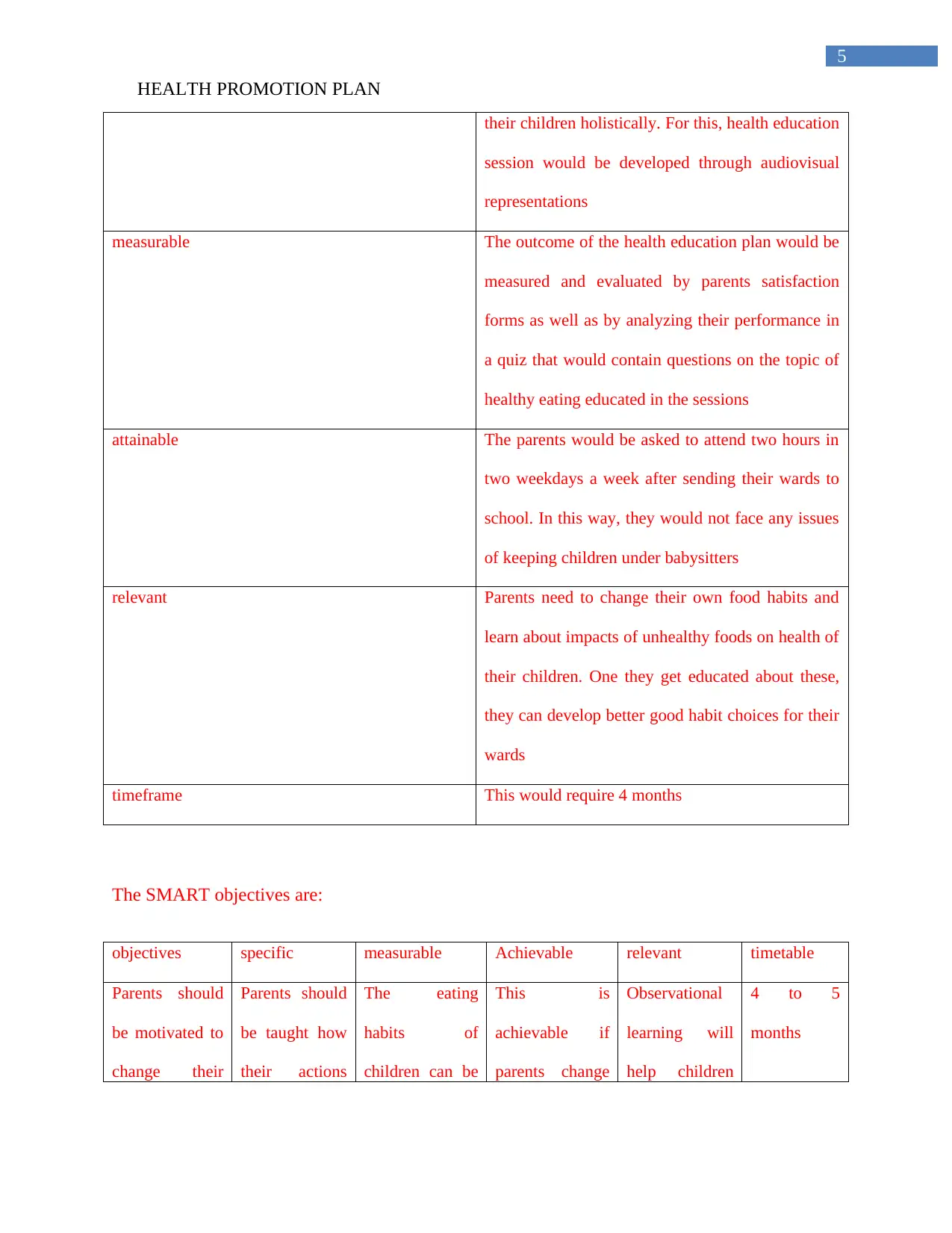
5
HEALTH PROMOTION PLAN
their children holistically. For this, health education
session would be developed through audiovisual
representations
measurable The outcome of the health education plan would be
measured and evaluated by parents satisfaction
forms as well as by analyzing their performance in
a quiz that would contain questions on the topic of
healthy eating educated in the sessions
attainable The parents would be asked to attend two hours in
two weekdays a week after sending their wards to
school. In this way, they would not face any issues
of keeping children under babysitters
relevant Parents need to change their own food habits and
learn about impacts of unhealthy foods on health of
their children. One they get educated about these,
they can develop better good habit choices for their
wards
timeframe This would require 4 months
The SMART objectives are:
objectives specific measurable Achievable relevant timetable
Parents should
be motivated to
change their
Parents should
be taught how
their actions
The eating
habits of
children can be
This is
achievable if
parents change
Observational
learning will
help children
4 to 5
months
HEALTH PROMOTION PLAN
their children holistically. For this, health education
session would be developed through audiovisual
representations
measurable The outcome of the health education plan would be
measured and evaluated by parents satisfaction
forms as well as by analyzing their performance in
a quiz that would contain questions on the topic of
healthy eating educated in the sessions
attainable The parents would be asked to attend two hours in
two weekdays a week after sending their wards to
school. In this way, they would not face any issues
of keeping children under babysitters
relevant Parents need to change their own food habits and
learn about impacts of unhealthy foods on health of
their children. One they get educated about these,
they can develop better good habit choices for their
wards
timeframe This would require 4 months
The SMART objectives are:
objectives specific measurable Achievable relevant timetable
Parents should
be motivated to
change their
Parents should
be taught how
their actions
The eating
habits of
children can be
This is
achievable if
parents change
Observational
learning will
help children
4 to 5
months
⊘ This is a preview!⊘
Do you want full access?
Subscribe today to unlock all pages.

Trusted by 1+ million students worldwide
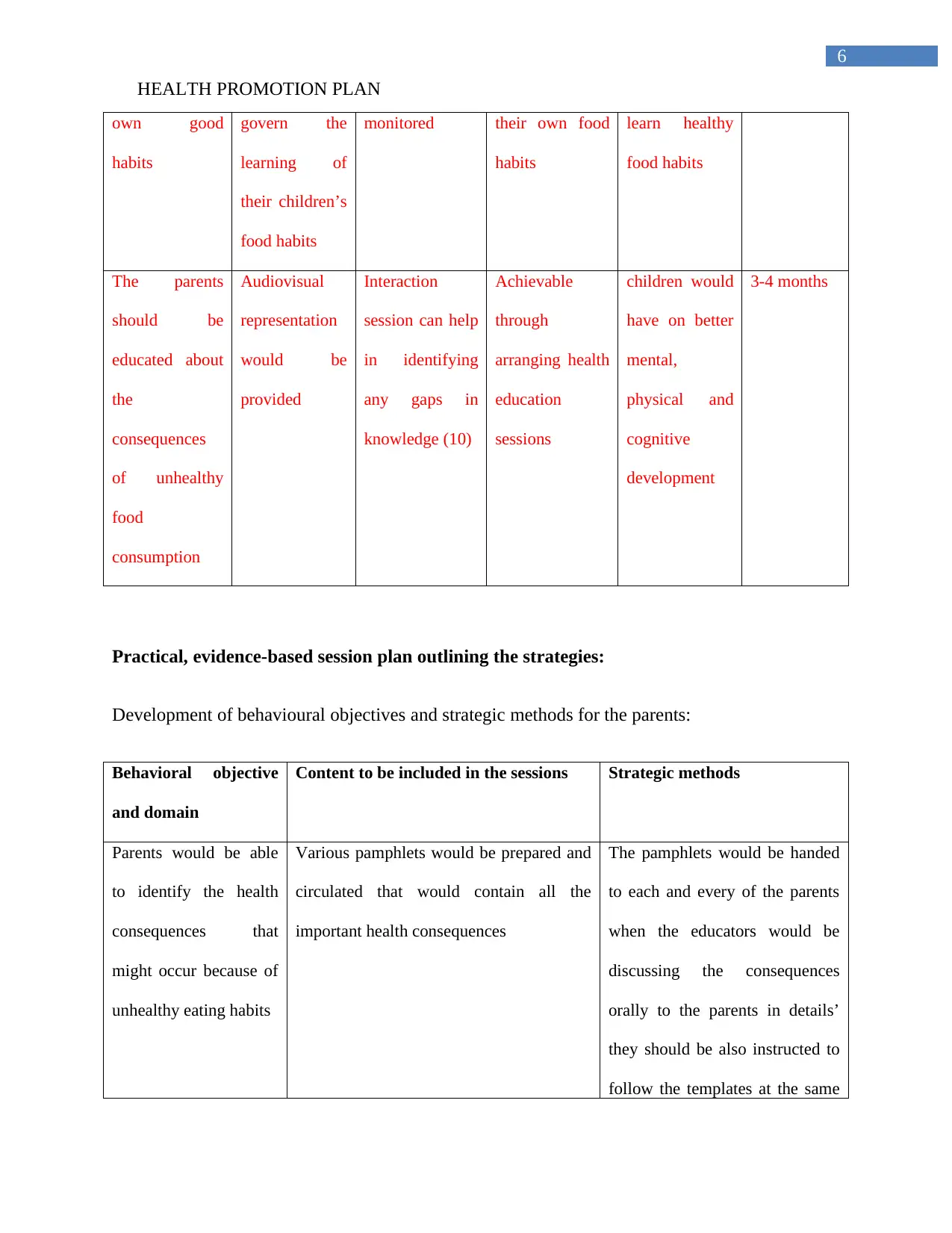
6
HEALTH PROMOTION PLAN
own good
habits
govern the
learning of
their children’s
food habits
monitored their own food
habits
learn healthy
food habits
The parents
should be
educated about
the
consequences
of unhealthy
food
consumption
Audiovisual
representation
would be
provided
Interaction
session can help
in identifying
any gaps in
knowledge (10)
Achievable
through
arranging health
education
sessions
children would
have on better
mental,
physical and
cognitive
development
3-4 months
Practical, evidence-based session plan outlining the strategies:
Development of behavioural objectives and strategic methods for the parents:
Behavioral objective
and domain
Content to be included in the sessions Strategic methods
Parents would be able
to identify the health
consequences that
might occur because of
unhealthy eating habits
Various pamphlets would be prepared and
circulated that would contain all the
important health consequences
The pamphlets would be handed
to each and every of the parents
when the educators would be
discussing the consequences
orally to the parents in details’
they should be also instructed to
follow the templates at the same
HEALTH PROMOTION PLAN
own good
habits
govern the
learning of
their children’s
food habits
monitored their own food
habits
learn healthy
food habits
The parents
should be
educated about
the
consequences
of unhealthy
food
consumption
Audiovisual
representation
would be
provided
Interaction
session can help
in identifying
any gaps in
knowledge (10)
Achievable
through
arranging health
education
sessions
children would
have on better
mental,
physical and
cognitive
development
3-4 months
Practical, evidence-based session plan outlining the strategies:
Development of behavioural objectives and strategic methods for the parents:
Behavioral objective
and domain
Content to be included in the sessions Strategic methods
Parents would be able
to identify the health
consequences that
might occur because of
unhealthy eating habits
Various pamphlets would be prepared and
circulated that would contain all the
important health consequences
The pamphlets would be handed
to each and every of the parents
when the educators would be
discussing the consequences
orally to the parents in details’
they should be also instructed to
follow the templates at the same
Paraphrase This Document
Need a fresh take? Get an instant paraphrase of this document with our AI Paraphraser
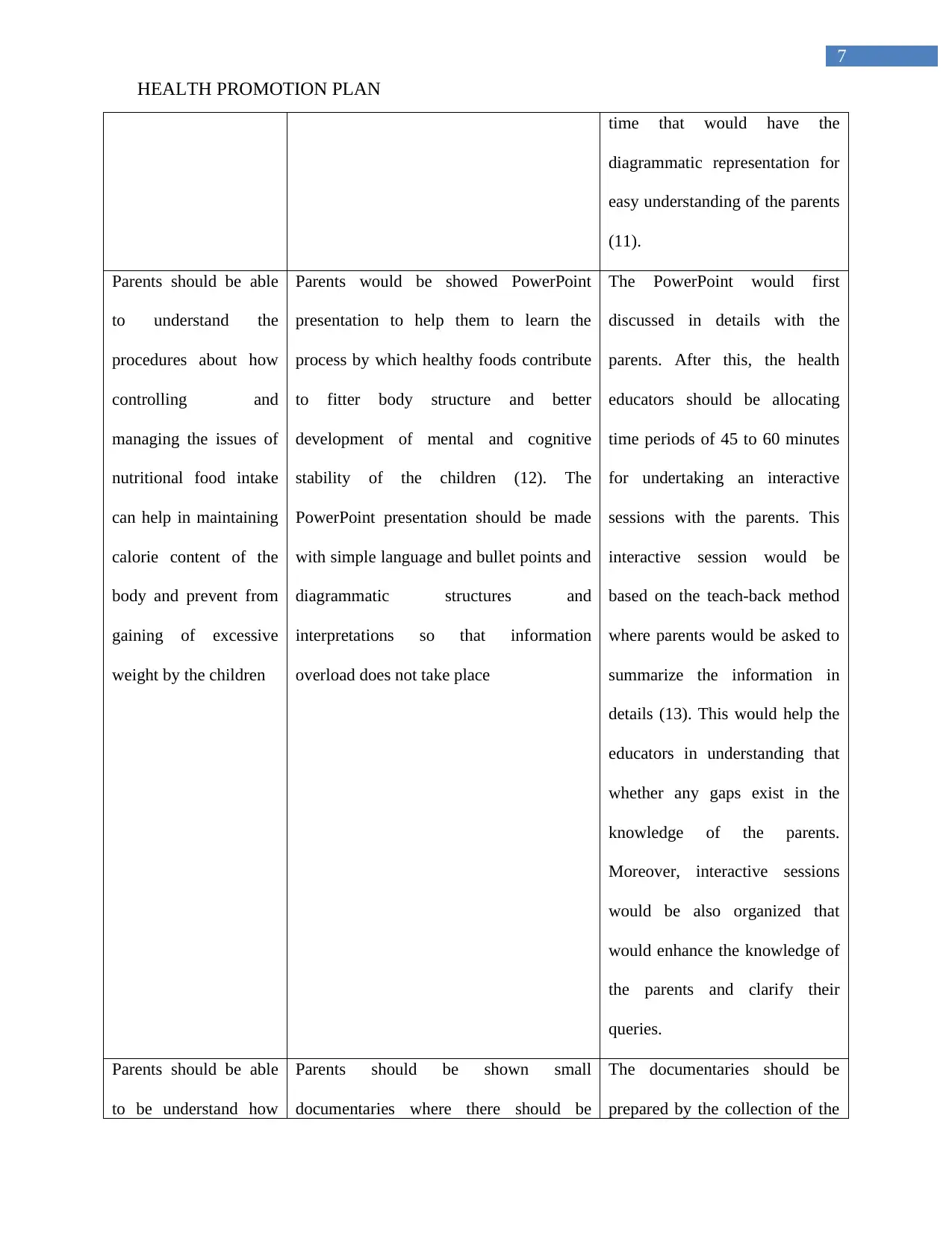
7
HEALTH PROMOTION PLAN
time that would have the
diagrammatic representation for
easy understanding of the parents
(11).
Parents should be able
to understand the
procedures about how
controlling and
managing the issues of
nutritional food intake
can help in maintaining
calorie content of the
body and prevent from
gaining of excessive
weight by the children
Parents would be showed PowerPoint
presentation to help them to learn the
process by which healthy foods contribute
to fitter body structure and better
development of mental and cognitive
stability of the children (12). The
PowerPoint presentation should be made
with simple language and bullet points and
diagrammatic structures and
interpretations so that information
overload does not take place
The PowerPoint would first
discussed in details with the
parents. After this, the health
educators should be allocating
time periods of 45 to 60 minutes
for undertaking an interactive
sessions with the parents. This
interactive session would be
based on the teach-back method
where parents would be asked to
summarize the information in
details (13). This would help the
educators in understanding that
whether any gaps exist in the
knowledge of the parents.
Moreover, interactive sessions
would be also organized that
would enhance the knowledge of
the parents and clarify their
queries.
Parents should be able
to be understand how
Parents should be shown small
documentaries where there should be
The documentaries should be
prepared by the collection of the
HEALTH PROMOTION PLAN
time that would have the
diagrammatic representation for
easy understanding of the parents
(11).
Parents should be able
to understand the
procedures about how
controlling and
managing the issues of
nutritional food intake
can help in maintaining
calorie content of the
body and prevent from
gaining of excessive
weight by the children
Parents would be showed PowerPoint
presentation to help them to learn the
process by which healthy foods contribute
to fitter body structure and better
development of mental and cognitive
stability of the children (12). The
PowerPoint presentation should be made
with simple language and bullet points and
diagrammatic structures and
interpretations so that information
overload does not take place
The PowerPoint would first
discussed in details with the
parents. After this, the health
educators should be allocating
time periods of 45 to 60 minutes
for undertaking an interactive
sessions with the parents. This
interactive session would be
based on the teach-back method
where parents would be asked to
summarize the information in
details (13). This would help the
educators in understanding that
whether any gaps exist in the
knowledge of the parents.
Moreover, interactive sessions
would be also organized that
would enhance the knowledge of
the parents and clarify their
queries.
Parents should be able
to be understand how
Parents should be shown small
documentaries where there should be
The documentaries should be
prepared by the collection of the
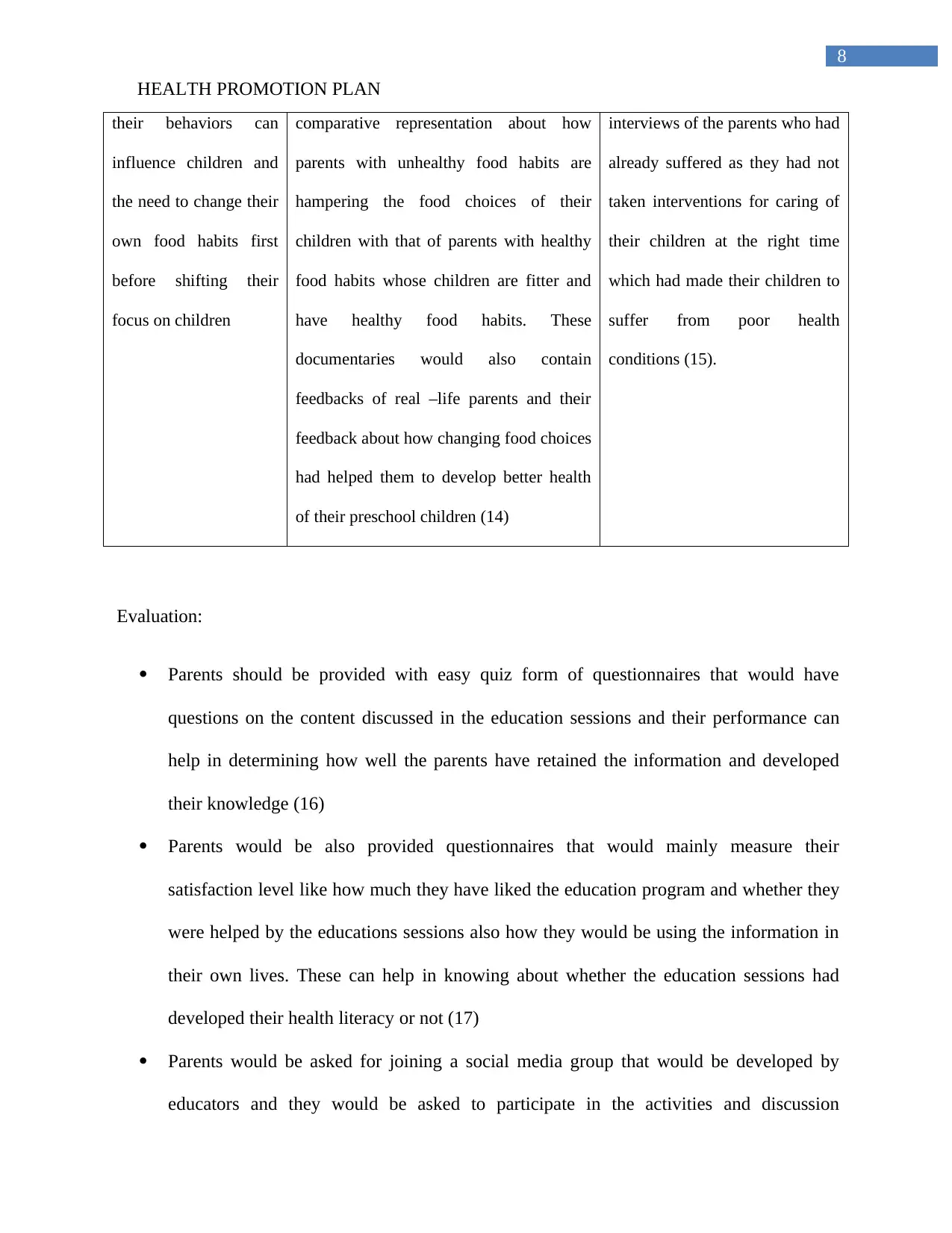
8
HEALTH PROMOTION PLAN
their behaviors can
influence children and
the need to change their
own food habits first
before shifting their
focus on children
comparative representation about how
parents with unhealthy food habits are
hampering the food choices of their
children with that of parents with healthy
food habits whose children are fitter and
have healthy food habits. These
documentaries would also contain
feedbacks of real –life parents and their
feedback about how changing food choices
had helped them to develop better health
of their preschool children (14)
interviews of the parents who had
already suffered as they had not
taken interventions for caring of
their children at the right time
which had made their children to
suffer from poor health
conditions (15).
Evaluation:
Parents should be provided with easy quiz form of questionnaires that would have
questions on the content discussed in the education sessions and their performance can
help in determining how well the parents have retained the information and developed
their knowledge (16)
Parents would be also provided questionnaires that would mainly measure their
satisfaction level like how much they have liked the education program and whether they
were helped by the educations sessions also how they would be using the information in
their own lives. These can help in knowing about whether the education sessions had
developed their health literacy or not (17)
Parents would be asked for joining a social media group that would be developed by
educators and they would be asked to participate in the activities and discussion
HEALTH PROMOTION PLAN
their behaviors can
influence children and
the need to change their
own food habits first
before shifting their
focus on children
comparative representation about how
parents with unhealthy food habits are
hampering the food choices of their
children with that of parents with healthy
food habits whose children are fitter and
have healthy food habits. These
documentaries would also contain
feedbacks of real –life parents and their
feedback about how changing food choices
had helped them to develop better health
of their preschool children (14)
interviews of the parents who had
already suffered as they had not
taken interventions for caring of
their children at the right time
which had made their children to
suffer from poor health
conditions (15).
Evaluation:
Parents should be provided with easy quiz form of questionnaires that would have
questions on the content discussed in the education sessions and their performance can
help in determining how well the parents have retained the information and developed
their knowledge (16)
Parents would be also provided questionnaires that would mainly measure their
satisfaction level like how much they have liked the education program and whether they
were helped by the educations sessions also how they would be using the information in
their own lives. These can help in knowing about whether the education sessions had
developed their health literacy or not (17)
Parents would be asked for joining a social media group that would be developed by
educators and they would be asked to participate in the activities and discussion
⊘ This is a preview!⊘
Do you want full access?
Subscribe today to unlock all pages.

Trusted by 1+ million students worldwide
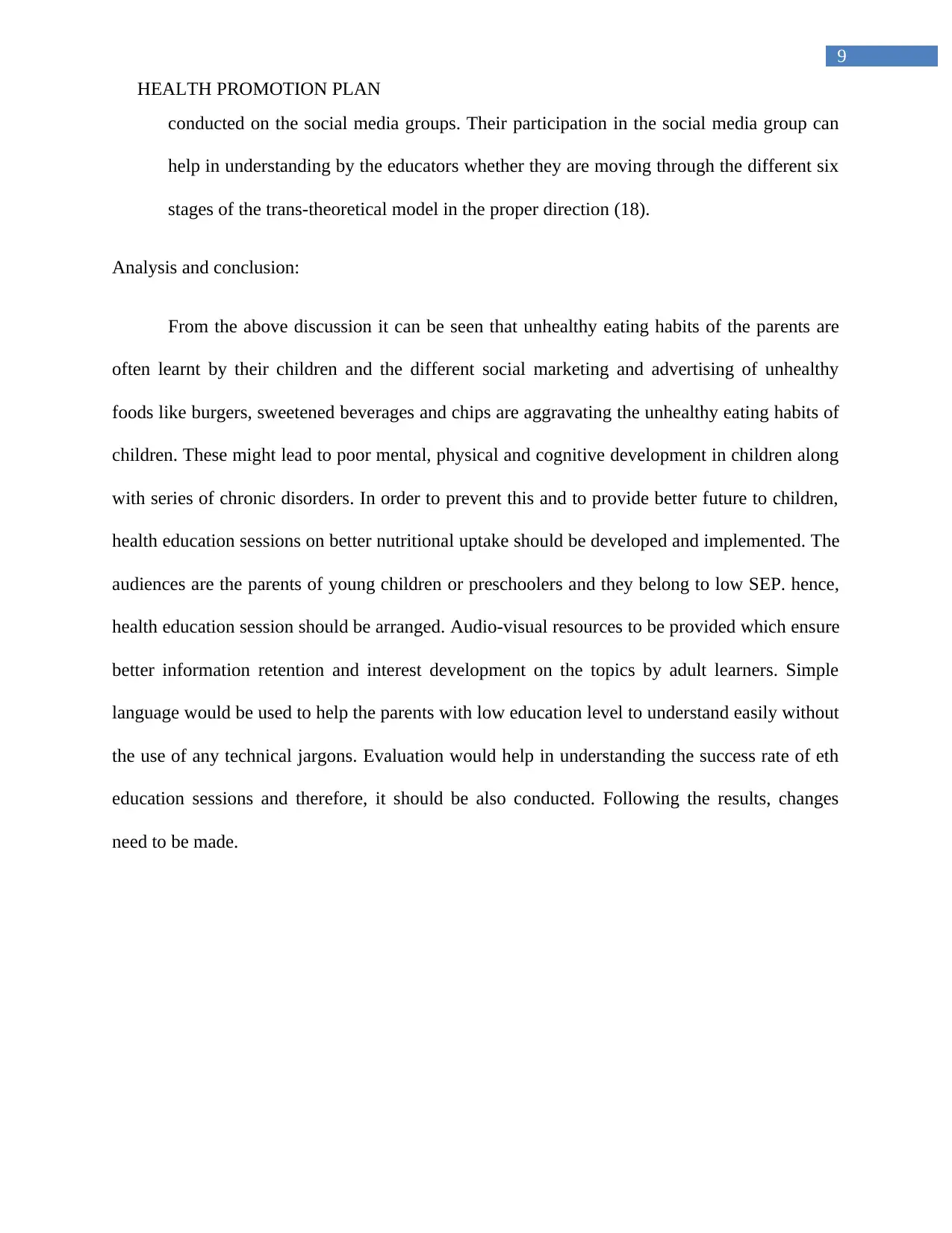
9
HEALTH PROMOTION PLAN
conducted on the social media groups. Their participation in the social media group can
help in understanding by the educators whether they are moving through the different six
stages of the trans-theoretical model in the proper direction (18).
Analysis and conclusion:
From the above discussion it can be seen that unhealthy eating habits of the parents are
often learnt by their children and the different social marketing and advertising of unhealthy
foods like burgers, sweetened beverages and chips are aggravating the unhealthy eating habits of
children. These might lead to poor mental, physical and cognitive development in children along
with series of chronic disorders. In order to prevent this and to provide better future to children,
health education sessions on better nutritional uptake should be developed and implemented. The
audiences are the parents of young children or preschoolers and they belong to low SEP. hence,
health education session should be arranged. Audio-visual resources to be provided which ensure
better information retention and interest development on the topics by adult learners. Simple
language would be used to help the parents with low education level to understand easily without
the use of any technical jargons. Evaluation would help in understanding the success rate of eth
education sessions and therefore, it should be also conducted. Following the results, changes
need to be made.
HEALTH PROMOTION PLAN
conducted on the social media groups. Their participation in the social media group can
help in understanding by the educators whether they are moving through the different six
stages of the trans-theoretical model in the proper direction (18).
Analysis and conclusion:
From the above discussion it can be seen that unhealthy eating habits of the parents are
often learnt by their children and the different social marketing and advertising of unhealthy
foods like burgers, sweetened beverages and chips are aggravating the unhealthy eating habits of
children. These might lead to poor mental, physical and cognitive development in children along
with series of chronic disorders. In order to prevent this and to provide better future to children,
health education sessions on better nutritional uptake should be developed and implemented. The
audiences are the parents of young children or preschoolers and they belong to low SEP. hence,
health education session should be arranged. Audio-visual resources to be provided which ensure
better information retention and interest development on the topics by adult learners. Simple
language would be used to help the parents with low education level to understand easily without
the use of any technical jargons. Evaluation would help in understanding the success rate of eth
education sessions and therefore, it should be also conducted. Following the results, changes
need to be made.
Paraphrase This Document
Need a fresh take? Get an instant paraphrase of this document with our AI Paraphraser
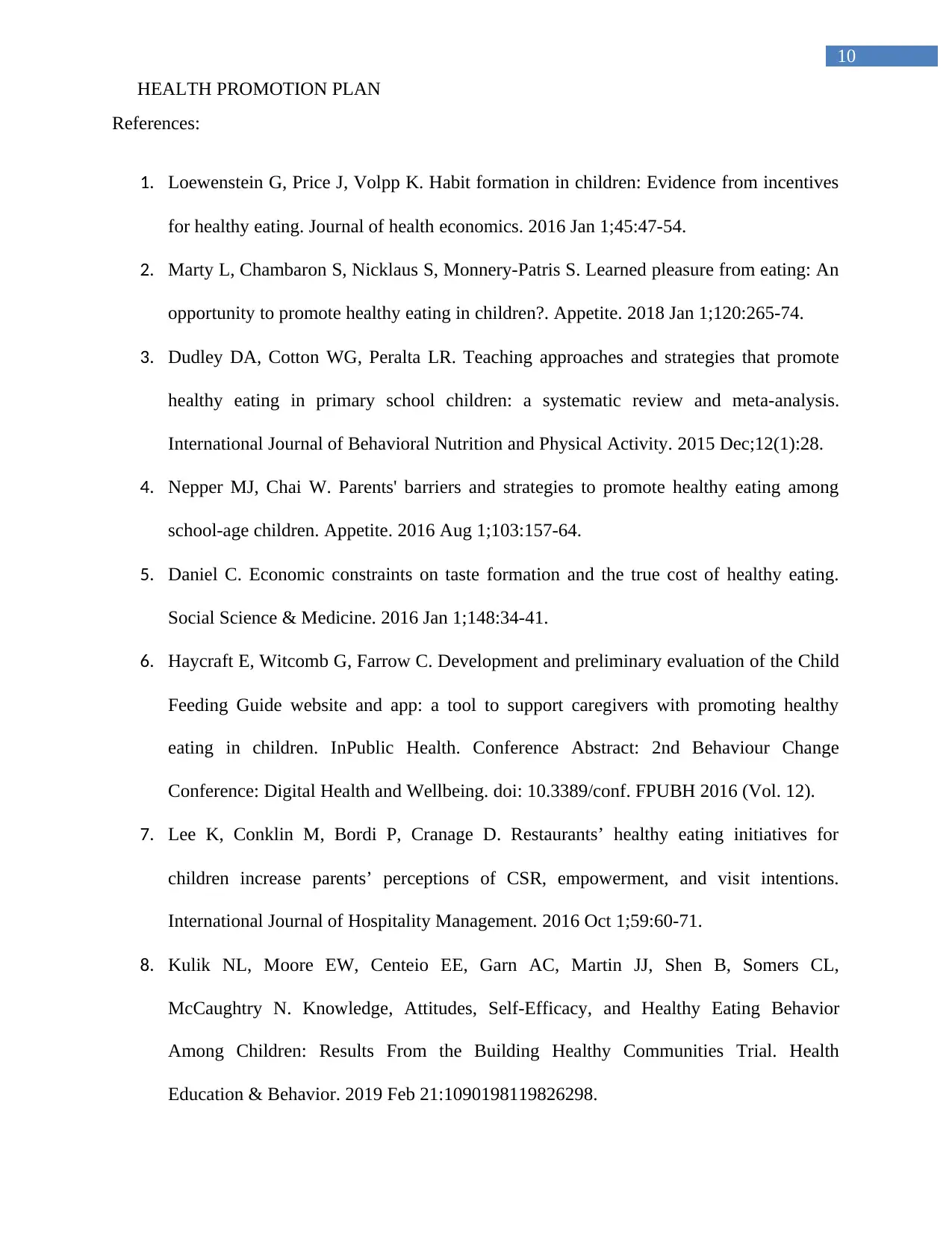
10
HEALTH PROMOTION PLAN
References:
1. Loewenstein G, Price J, Volpp K. Habit formation in children: Evidence from incentives
for healthy eating. Journal of health economics. 2016 Jan 1;45:47-54.
2. Marty L, Chambaron S, Nicklaus S, Monnery-Patris S. Learned pleasure from eating: An
opportunity to promote healthy eating in children?. Appetite. 2018 Jan 1;120:265-74.
3. Dudley DA, Cotton WG, Peralta LR. Teaching approaches and strategies that promote
healthy eating in primary school children: a systematic review and meta-analysis.
International Journal of Behavioral Nutrition and Physical Activity. 2015 Dec;12(1):28.
4. Nepper MJ, Chai W. Parents' barriers and strategies to promote healthy eating among
school-age children. Appetite. 2016 Aug 1;103:157-64.
5. Daniel C. Economic constraints on taste formation and the true cost of healthy eating.
Social Science & Medicine. 2016 Jan 1;148:34-41.
6. Haycraft E, Witcomb G, Farrow C. Development and preliminary evaluation of the Child
Feeding Guide website and app: a tool to support caregivers with promoting healthy
eating in children. InPublic Health. Conference Abstract: 2nd Behaviour Change
Conference: Digital Health and Wellbeing. doi: 10.3389/conf. FPUBH 2016 (Vol. 12).
7. Lee K, Conklin M, Bordi P, Cranage D. Restaurants’ healthy eating initiatives for
children increase parents’ perceptions of CSR, empowerment, and visit intentions.
International Journal of Hospitality Management. 2016 Oct 1;59:60-71.
8. Kulik NL, Moore EW, Centeio EE, Garn AC, Martin JJ, Shen B, Somers CL,
McCaughtry N. Knowledge, Attitudes, Self-Efficacy, and Healthy Eating Behavior
Among Children: Results From the Building Healthy Communities Trial. Health
Education & Behavior. 2019 Feb 21:1090198119826298.
HEALTH PROMOTION PLAN
References:
1. Loewenstein G, Price J, Volpp K. Habit formation in children: Evidence from incentives
for healthy eating. Journal of health economics. 2016 Jan 1;45:47-54.
2. Marty L, Chambaron S, Nicklaus S, Monnery-Patris S. Learned pleasure from eating: An
opportunity to promote healthy eating in children?. Appetite. 2018 Jan 1;120:265-74.
3. Dudley DA, Cotton WG, Peralta LR. Teaching approaches and strategies that promote
healthy eating in primary school children: a systematic review and meta-analysis.
International Journal of Behavioral Nutrition and Physical Activity. 2015 Dec;12(1):28.
4. Nepper MJ, Chai W. Parents' barriers and strategies to promote healthy eating among
school-age children. Appetite. 2016 Aug 1;103:157-64.
5. Daniel C. Economic constraints on taste formation and the true cost of healthy eating.
Social Science & Medicine. 2016 Jan 1;148:34-41.
6. Haycraft E, Witcomb G, Farrow C. Development and preliminary evaluation of the Child
Feeding Guide website and app: a tool to support caregivers with promoting healthy
eating in children. InPublic Health. Conference Abstract: 2nd Behaviour Change
Conference: Digital Health and Wellbeing. doi: 10.3389/conf. FPUBH 2016 (Vol. 12).
7. Lee K, Conklin M, Bordi P, Cranage D. Restaurants’ healthy eating initiatives for
children increase parents’ perceptions of CSR, empowerment, and visit intentions.
International Journal of Hospitality Management. 2016 Oct 1;59:60-71.
8. Kulik NL, Moore EW, Centeio EE, Garn AC, Martin JJ, Shen B, Somers CL,
McCaughtry N. Knowledge, Attitudes, Self-Efficacy, and Healthy Eating Behavior
Among Children: Results From the Building Healthy Communities Trial. Health
Education & Behavior. 2019 Feb 21:1090198119826298.
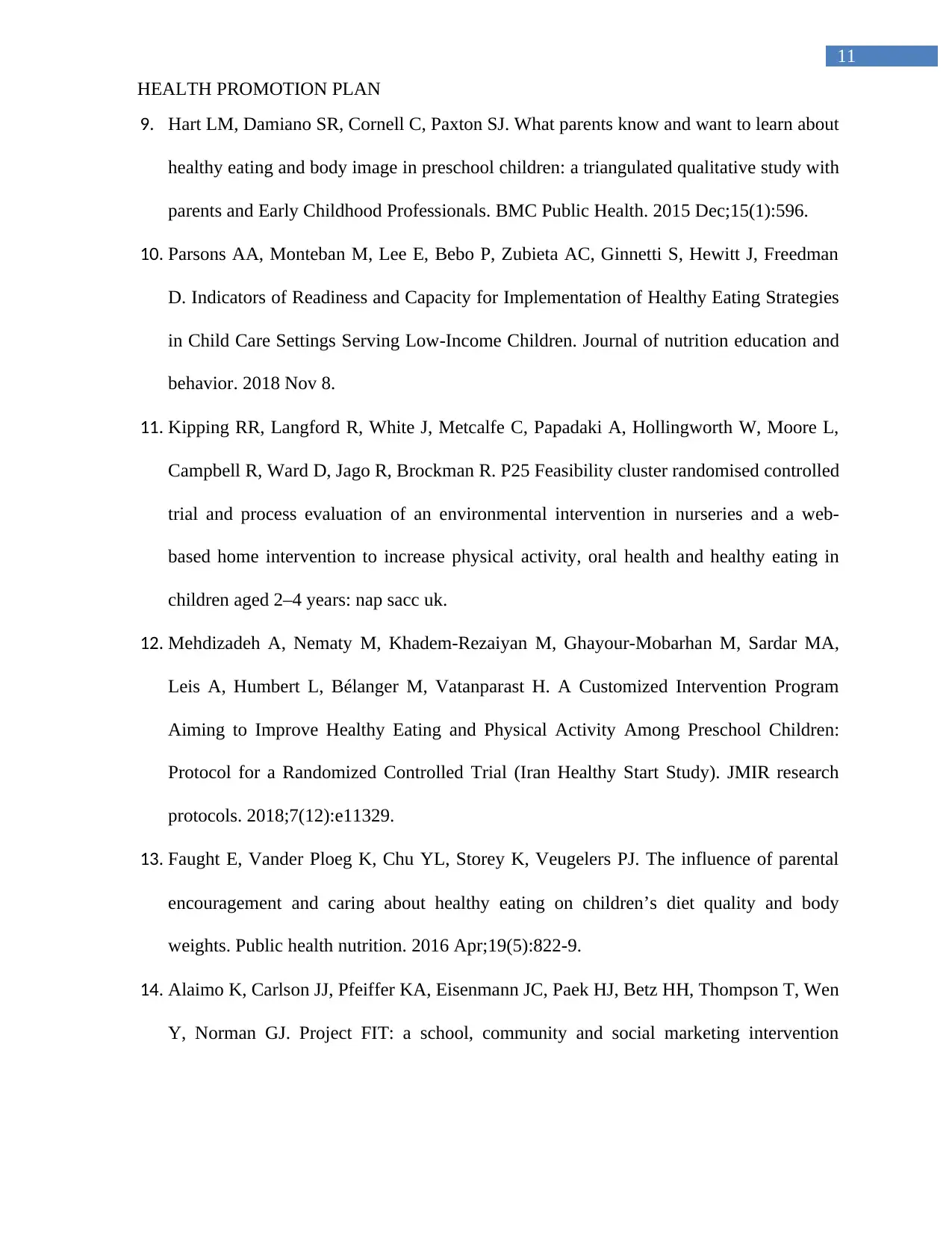
11
HEALTH PROMOTION PLAN
9. Hart LM, Damiano SR, Cornell C, Paxton SJ. What parents know and want to learn about
healthy eating and body image in preschool children: a triangulated qualitative study with
parents and Early Childhood Professionals. BMC Public Health. 2015 Dec;15(1):596.
10. Parsons AA, Monteban M, Lee E, Bebo P, Zubieta AC, Ginnetti S, Hewitt J, Freedman
D. Indicators of Readiness and Capacity for Implementation of Healthy Eating Strategies
in Child Care Settings Serving Low-Income Children. Journal of nutrition education and
behavior. 2018 Nov 8.
11. Kipping RR, Langford R, White J, Metcalfe C, Papadaki A, Hollingworth W, Moore L,
Campbell R, Ward D, Jago R, Brockman R. P25 Feasibility cluster randomised controlled
trial and process evaluation of an environmental intervention in nurseries and a web-
based home intervention to increase physical activity, oral health and healthy eating in
children aged 2–4 years: nap sacc uk.
12. Mehdizadeh A, Nematy M, Khadem-Rezaiyan M, Ghayour-Mobarhan M, Sardar MA,
Leis A, Humbert L, Bélanger M, Vatanparast H. A Customized Intervention Program
Aiming to Improve Healthy Eating and Physical Activity Among Preschool Children:
Protocol for a Randomized Controlled Trial (Iran Healthy Start Study). JMIR research
protocols. 2018;7(12):e11329.
13. Faught E, Vander Ploeg K, Chu YL, Storey K, Veugelers PJ. The influence of parental
encouragement and caring about healthy eating on children’s diet quality and body
weights. Public health nutrition. 2016 Apr;19(5):822-9.
14. Alaimo K, Carlson JJ, Pfeiffer KA, Eisenmann JC, Paek HJ, Betz HH, Thompson T, Wen
Y, Norman GJ. Project FIT: a school, community and social marketing intervention
HEALTH PROMOTION PLAN
9. Hart LM, Damiano SR, Cornell C, Paxton SJ. What parents know and want to learn about
healthy eating and body image in preschool children: a triangulated qualitative study with
parents and Early Childhood Professionals. BMC Public Health. 2015 Dec;15(1):596.
10. Parsons AA, Monteban M, Lee E, Bebo P, Zubieta AC, Ginnetti S, Hewitt J, Freedman
D. Indicators of Readiness and Capacity for Implementation of Healthy Eating Strategies
in Child Care Settings Serving Low-Income Children. Journal of nutrition education and
behavior. 2018 Nov 8.
11. Kipping RR, Langford R, White J, Metcalfe C, Papadaki A, Hollingworth W, Moore L,
Campbell R, Ward D, Jago R, Brockman R. P25 Feasibility cluster randomised controlled
trial and process evaluation of an environmental intervention in nurseries and a web-
based home intervention to increase physical activity, oral health and healthy eating in
children aged 2–4 years: nap sacc uk.
12. Mehdizadeh A, Nematy M, Khadem-Rezaiyan M, Ghayour-Mobarhan M, Sardar MA,
Leis A, Humbert L, Bélanger M, Vatanparast H. A Customized Intervention Program
Aiming to Improve Healthy Eating and Physical Activity Among Preschool Children:
Protocol for a Randomized Controlled Trial (Iran Healthy Start Study). JMIR research
protocols. 2018;7(12):e11329.
13. Faught E, Vander Ploeg K, Chu YL, Storey K, Veugelers PJ. The influence of parental
encouragement and caring about healthy eating on children’s diet quality and body
weights. Public health nutrition. 2016 Apr;19(5):822-9.
14. Alaimo K, Carlson JJ, Pfeiffer KA, Eisenmann JC, Paek HJ, Betz HH, Thompson T, Wen
Y, Norman GJ. Project FIT: a school, community and social marketing intervention
⊘ This is a preview!⊘
Do you want full access?
Subscribe today to unlock all pages.

Trusted by 1+ million students worldwide
1 out of 13
Related Documents
Your All-in-One AI-Powered Toolkit for Academic Success.
+13062052269
info@desklib.com
Available 24*7 on WhatsApp / Email
![[object Object]](/_next/static/media/star-bottom.7253800d.svg)
Unlock your academic potential
Copyright © 2020–2026 A2Z Services. All Rights Reserved. Developed and managed by ZUCOL.





